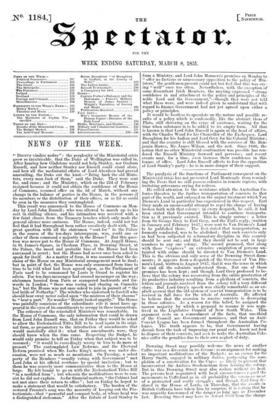The paralysis of the functions of Parliament consequent on the
Ministerial crisis has not prevented Lord Monteagle from remind- ing the Peers that we still possess colonies in remote regions, with irritating grievances crying for redress. He called attention to the resistance which the Australian Co- lonies threaten to the further transportation of convicts to that part of the world, and enlarged on the unjust treatment whichTan Diemen's Land in particular has experienced in this respect. Earl Grey made an unsuccessful attempt to repel the charge of having broken faith with that colony: in every despatch, he said, it had been stated that Government intended to continue transporta- tion as it previously existed. This is simply untrue : a letter from Sir George Grey to Earl Grey, and the Earl's reply, (written in January and February 1847,) were sent to Van Diemen's Land to be published there. The first stated that transportation, as formerly conducted, was to be abolished ; that such convicts only as had been subjected to reformatory discipline in this country should be sent out ; and that they should not be sent in large numbers to any one colony. The second promised, that along with those " expirees " an extensive emigration of persons un- tainted with crime should be directed to Van Diemen's Land. This is the obvious and only sense of the Downing Street docu- ments ; it appears from a despatch of the Governor of Van Die- men's Land, written in August 1847, that it was the sense in which he and all the colonists understood them. Not one of those promises has been kept ; and though Lord Grey professed to be- lieve that the colony was recovering from the entire prostration of its productive industry resulting from a plethora of convicts, the letters and journals received from the colony tell a very different story. But Lord Grey's speech was chiefly remarkable as an ex- plicit avowal that the old system of convict transportation is to be revived in full force for the whole of Australia. He affected to believe that the aversion to receive convicts is decreasing in those colonies. As a reason for this belief, he assigned the narrow majority by which a proposal to resume it was nega- tived in the Legislative Council of New South Wales. This argument rests on a concealment of the facts, that one-third of the Council are Government nominees, and that an Anti- Convict League has been formed throughout the Australian Co- lonies. The truth appears to be, that Government having shrunk from the task of improving our penal code, know not how to dispose of their convicts, and seek to make the Australian Colo- nies suffer the penalties due to their own neglect of duty.


























